The 10 best destinations in France for wine
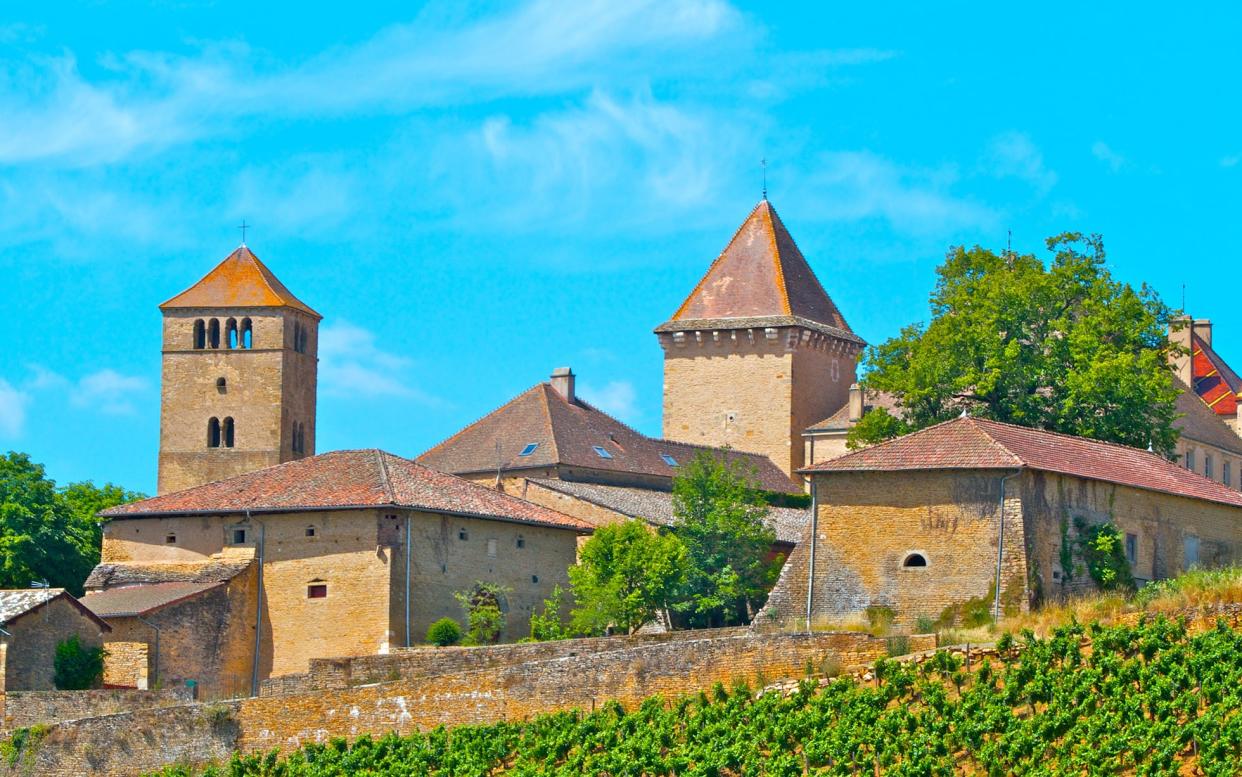
France has taken its time getting around to wine tourism. Our neighbours long considered that their wine sufficed unto itself. It barely needed marketing, let alone the bells and whistles of tourism. They’ve changed recently, mind. Whether it be in prestige projects such as the luxury hotel, restaurant and vineyard of the Domaine La Coste, near Aix (granted, the brainchild of an Irishman) or the fellow with a beret opening his cellar door with a smile rather than a scowl, they’re getting the hang of it. And it’s paying. The latest figures available – for 2016 – suggest that wine-associated tourism attracted 10 million visitors, as against 7.5 million in 2009. It generated £4.6 billion. That’s a lot of money. Should you wish to add to it, here are 10 of our favourite French wine visitor experiences.
1. Cité du Vin, Bordeaux
The French long struggled to come up with a worthwhile wine museum. They had lots, but they were tedious. So, a warm welcome to the Cité. The grand shiny swirl of a building rises by the Garonne river, taking wine into new realms of entertainment, rendering it fun even for those who can’t tell a cabernet sauvignon from a dandelion and burdock. Across six floors, it’s a hi-tech romp of panache, insight and enormous inventiveness, grabbing you by all senses for an interactive waltz through wine and its attendant subjects: art, culture, agriculture, transport (look out for a terrific moving boat show), civilisation and sensuality. Particularly memorable is a banqueting chamber alive with holograms and a floor show tackling wine, food and festivity through the ages. There are tastings, a panoramic restaurant up top and, from March 23 to June 24, a temporary show exploring wine and music. The place, in short, well justifies the £18 entry fee (laciteduvin.com).
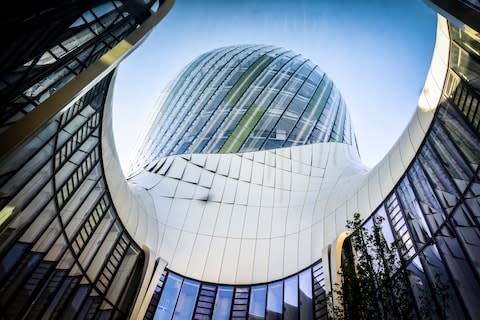
2. Chateau de Pierreclos, Pouilly-Fuissé, Burgundy
Burgundy is rife with chateaux, manors, abbeys and other testimonies to a past of temporal and spiritual prominence. But the region took early retirement from international affairs to play to its real strengths: eating, drinking and growing red in the face. The great buildings serve this purpose as well as they served the former one, and none more happily than the medieval Pierreclos, rising magnificently on a knoll just outside the eponymous village, west of Macon. Here be fine wine, accommodation and the sense that the revolution never quite got this far. The glorious gold-stone spot overlooks a ruffled landscape – hills, vines topped with forest, artfully placed farmsteads – indicating that all is well with France. Within, the medieval cellars, kitchens and salons are remarkable, the Pouilly-Fuissé and St Véran wines excellent and the B&B rooms of the sort where Marie Antoinette would have happily slept. That chatelaine Anne-Fran?oise Pidault is brisk, brilliant and beautiful does no harm either (chateaudepierreclos.com, B&B doubles from £146).
3. Hameau du Vin, Romanèche-Thorins, Beaujolais
Georges Duboeuf is the seigneur of Beaujolais wines, a mix of French winemaker and New World entrepreneur. At the Hameau du Vin (“wine hamlet”) he welcomes tots, ageing wine buffs and all in between to what is really a wine theme park. Serious information about 2,000 years of wine is dressed in the liveliest clothes – videos, animations, theatrics, 3D cinema – and set alongside wonderful gardens, a little train, crazy golf, a brasserie like an old station buffet and much else besides. I love the Beaujolais and this place does it proud. I’ve been often and shall go again (hameauduboeuf.com; £16).
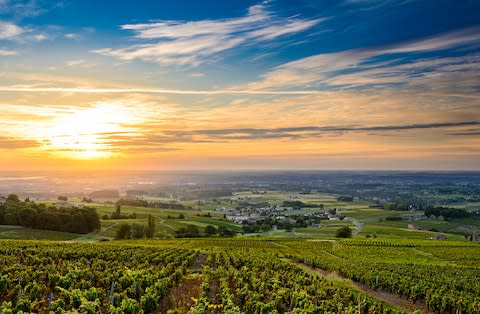
4. Jean Becker, Zellenberg, Colmar, Alsace
At the hinge of the Vosges mountains and Rhine plain, the Alsace wine route curls between castle-capped hills and half-timbered villages where Alsaciens seek refuge from their hectic history. Beamed and beaming family wineries abound. We favour Becker because the wines are outstanding, the welcome from multilingual Martine Becker warm and bracing, and the range of visitor possibilities wide. There are any number of tasting options on the venerable premises – including instruction in the matter with seven wines, foie gras and Munster cheese for £107 for two. Guided vineyard walks kick off at 6.30pm on Thursdays, mid-July to the end of August. Picnics happen. Cookery classes may be arranged. Don’t miss the place. Call on 0033 389 479016 – Mme Becker speaks better English than you do (vinsbecker.com).
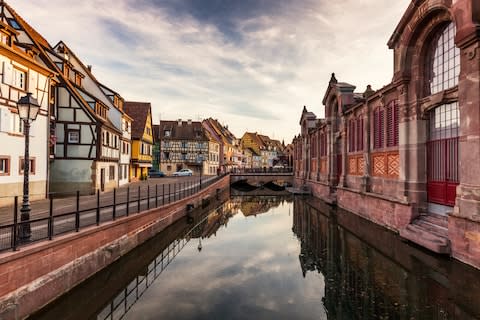
5. Champagne
Champagne is as tooled up, and rewarding, for visitors as any French wine region. Should you have a lot of money and wish to experience Champagne in depth, Sébastien Crozatier knows the wine and its country inside out. He will usher you from highways to byways, exceptional cellars, standout restaurants and five-star hotels. He will also, if required, spill over into Alsace or Burgundy. For three days and two champagne nights, allow £2,213 per person (closdriver.com). Going solo, the best major house visit is provided by Taittinger, with its extraordinary cellars under Reims (taittinger.com). Fine family house visits may be had at Cramant, with Voirin-Jumel (champagne-voirin-jumel.com) and, especially, Charlier at Montigny-sous-Chatillon, where all is vinified in fine oak vats (champagne-charlier.com).
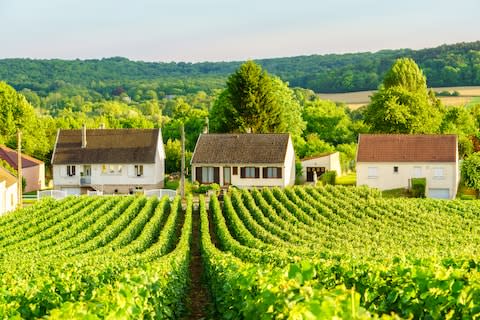
6. Chateau Les Farcies du Pech, Pécharmant, Bergerac, Dordogne
Bergerac wines are equal to most (but not all) of those made by their Bordeaux neighbours, and at a much lower cost. Pécharmant reds are, I reckon, the best of Bergerac, and those of the Dubard family at this 18th-century farmstead are perhaps the pick of the Pécharmants. The good news is that, having drunk the wine, one may also stay here. The family welcome is as from the country squirearchy and the vineyards and gardens may be wandered at will (farciesdupech.com; B&B doubles £107).
10 dishes you cannot leave France without eating
7. Chateau de Berne, Flayosc, Provence
At the end of the least promising country lane in Provence, Berne isn’t so much a wine domain as a micro-kingdom. There’s a raffish, rambling dignity about the monumental old stones which now house a five-star hotel, tip-top restaurant, spa, pool and all else the well-heeled wine-seeker might need. The winery has reds – and especially rosés – to rival any in the region. Some 290 acres of vines and 1,500 of forest are ideal for roaming or cycling, guided or solo. Remaining energy may be spent on tennis or cookery classes, or in the gym. Owned by British businessman Mark Dixon, Berne is a New World take on wine tourism, but infused with French elegance (chateauberne.com; doubles from £293).
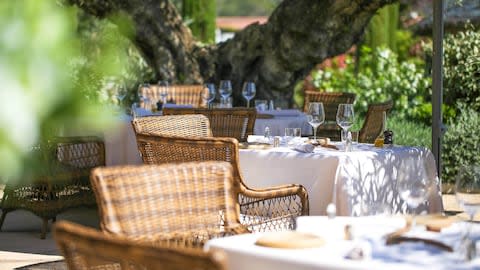
8. Chateau Ste Roseline, Les Arcs, Provence
A lovely site (outside Les Arcs, looking away to the Maures hills), a bright contemporary winery slotted into old stones, and outstanding wines. That’s enough, but there’s more. Up the slope from the winery, the former abbey’s chapel has the body of abbess Sainte Roseline in a crystal reliquary. She died in 1329, was dug up in 1334, found to be pretty much as was, and put on display. She lies still intact, if slightly blackened. Her eyes are in a case in the wall. They appear to be winking. Overseeing the whole is a terrific Chagall mosaic and a relief and bronze lantern by Giacometti. Reflect upon this, then repair for a restorative. Insist on the Cuvée Prieuré Rouge. It’s a cracker (sainte-roseline.com).
9. Chateau de Flaugergues, Montpellier
As close to the centre of Montpellier as you can get without being a car park, this chateau-vineyard resists encroachment. As it must. The 17th century folly and exquisite gardens have far too much dignity (and treasure) to be swallowed up. The wines are first-rate (go first for the Sommeliere Rouge), Comte Henri de Colbert’s family long-established, and their courtyard restaurant, Folia, spot on for a summer lunch: three courses, £21 (flaugergues.com). By night, if it’s a summer Friday, hie thee to a city centre colonised from 6.30pm by the Estivales, conceivably France’s biggest and jolliest weekly wine festival.
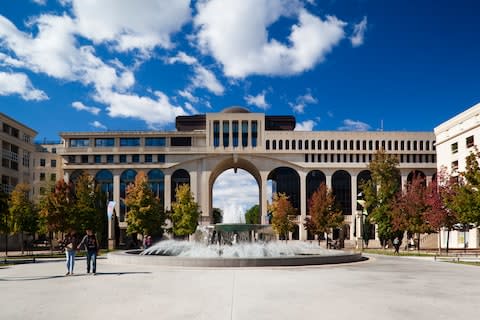
10. Domaine des Gauletteries, Ruillé-sur-Loir
That’s Loir without an “e”. It’s the river and valley to the north of the grander Loire, and it’s altogether cuddlier. Francine and Raynald Lelais, with their peppery and moreish Jasnières whites and C?teaux-du-Loir reds, will welcome you with ebullience to their tasting rooms and cellar maze (www.domainelelais.com), apparently bespoke-dug for ceremonies involving rams’ heads and virgins. Nearby La Possonnière manor house was the birthplace of France’s greatest 16th century poet, Pierre de Ronsard. He wrote: “Live now; believe me, wait not till tomorrow. Gather the roses of life today.” It’s the slogan that wine tourism needs.